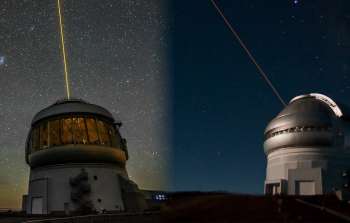sci16085 — Announcement
March Call for Proposals
March 1, 2016
Gemini North and South are accepting proposals for the Fast Turnaround (FT) program. Here, we give information specific to this proposal cycle. Please see the other FT pages - particularly the rules - for general information about the program. Users should be aware that FT-specific proposal templates must now be used for all FT proposals; see the "PIT information" section below.
- Important dates
- Proposal deadline: 23:59, Hawaiian Standard Time (HST), March 31.
- Reviews must be complete by 23:59 HST, April 14;
- Results will be announced by April 21;
- The deadline for preparing observations will be April 31. Observations will remain valid until the end of July;
- FT observations will be merged with the queue and observed on queue nights.
- Eligibility
- Acceptable RA ranges
- Targets from RA~7.5 hrs to ~0.5 hrs can be accepted during this cycle. Note that RAs near 7.5 will only be accessible for a few hours during the first month (May). RAs near 0.5 will only be accessible for a few hours during the final month (July).
- Available instruments and observing modes
- Gemini North
- GMOS, GNIRS, NIRI, and NIFS (including Altair NGS and LGS for the latter three) will be available during this FT period. However, GMOS will be unavailable in the second half of June, and NIRI and NIFS will be alternately available during the three months. A limited amount of GRACES time is available in late May / early June only. Note that the GRACES run will prevent the use of the GMOS-N IFU during that period. See the 2016A telescope schedulefor full details. .
- A limited amount of GRACES time may be available for FT programs.
- Gemini South
- GMOS-S and Flamingos-2 will be available during this FT block, as will a limited amount of GPI time. GeMS+GSAOI is not offered. F2 will not be on the telescope in May. See the 2016A telescope schedule for more information about instrument availability.
- Both telescopes
- Please contact the FT team (fast dot turnaround at gemini dot edu) with questions about GPI and GRACES availability.
- FT observations may not be executed during classical, priority visitor (PV) and Korean blocks, depending on the prevailing conditions.
- For GMOS proposals, please indicate whether your program could be carried out with either GMOS (North or South).
- The R600 grating in each GMOS instrument is NOT offered for FT (or regular queue) observations.
- MOS observations are now available for FT, subject to some caveats/restrictions
- As discussed in the rules and Q&A, please contact the Fast Turnaround team in advance of the deadline if you would like to propose for an unusual instrument configuration or observing mode.
- Time available
- 20 hrs per month at each telescope is available for FT observations. Very roughly, this implies:
- i. 4 hrs of 20%-ile conditions (IQ=20, for example; see this web page)
- ii. 10 hrs of 50%-ile conditions
- iii. 14 hrs of 70%-ile conditions
- iv. 17 hrs of 85%-ile conditions
- PIs may propose for up to roughly the amount of time in their most restrictive observing conditions (see the rules).
- 20 hrs per month at each telescope is available for FT observations. Very roughly, this implies:
- PIT information
- Proposals must be submitted using the version of the Phase I Tool specified on this web page (in the "Time Requests" tab, select Fast Turnaround Observing at Gemini as the proposal class).
- In the Time Requests tab, select "Fast Turnaround Observing at Gemini" as the proposal class and specify the reviewer (and mentor, if appropriate). Note that this is where the reviewer is defined; changes cannot be made after the proposal has been submitted.
- Dedicated LaTeX/Word templates must be used to prepare FT proposals: tex | sty | doc.
- Submitting the same proposal more than once during a given cycle (e.g. after correcting/editing a submitted version) should be avoided if at all possible.
- The FT proposal template (which differs somewhat from the queue template) is now compulsory for all FT proposals.
About the Announcement
| Id: |
ID
sci16085
|
